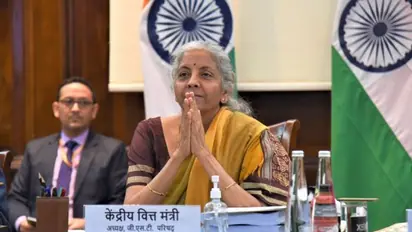Economic Survey 2023: India withstood extraordinary set of challenges better than most economies

Synopsis
India's economy is to grow 6.5 per cent in the financial year 2023-24 compared to 7 per cent in the current fiscal and 8.7 per cent in 2021-22.
Union Finance Minister Nirmala Sitharaman on Tuesday (January 31) tabled the Economic Survey 2023 in Parliament, which states that the Indian economy appears to have moved on after its encounter with the Coronavirus pandemic, staging a full recovery in FY22 ahead of many nations and positioning itself to ascend to the pre-pandemic growth path in FY23
The Economic Survey 2023 notes that India will remain the fastest-growing major economy, despite projected lower GDP growth of 6-6.8 per cent. Chief Economic Advisor V Anantha Nageswaran, who authored the Economic Survey 2023 report, will be addressing a media briefing along with other senior Finance Ministry officials.
Also read: Decisive government kept India's interest first; Indians' confidence at its peak: President Murmu
The Economic Survey 2023 cautions that the Indian rupee may come under pressure if the Current Account Deficit (CAD) continues to widen. Borrowing costs may remain 'higher for longer'; entrenched inflation may prolong the tightening cycle
Economic Survey 2022-23: Read full text here
"Credit disbursal, capital investment cycle, expansion of public digital platform and schemes like PLI, National Logistics Policy, and PM Gati Shakti to drive economic growth," the Economic Survey 2023 said.
The report exuded confidence that India has sufficient foreign exchange reserves to finance its Current Account Deficit (CAD) and intervene in forex market to manage rupee volatility. Production Linked Incentive (PLI) scheme, PM Gati Shakti, National Logistics Policy, expansion of public digital platform, capital investment cycle and credit disbursal will drive India's economic growth.
It also revealed that the sector's growth and buoyancy to the "measures taken by the government to augment crop and livestock productivity, ensure certainty of returns to the farmers through price support (Minimum Support Price), promote crop diversification" and, focused interventions to "enhance credit availability, facilitate mechanisation and boost horticulture and organic farming".
Also Read: Economic Survey 2023: President Droupadi Murmu hails 'aspirational districts' program; check details
In the pharma sector, the survey said that cumulative FDI in the pharma sector crossed the US$ 20 billion mark in September 2022. Further, FDI inflows have increased four-fold over five years until September 2022, to US$ 699 million.
The survey said that Inflation did not 'creep too far above' the tolerance range in India when compared to several advanced nations.
Also read: Economic Survey to peg 2023-24 GDP growth at around 6.5 per cent?
Export growth has moderated in the second half of the current fiscal. India's e-commerce market set to grow at 18 per cent year-on-year
"GDP growth will be driven by higher capital expenditure, strengthening the corporate balance sheet, private consumption, credit growth to small businesses, and return of migrant workers to cities," the Economic Survey 2023 said.
Government Capital Expenditure (Capex), which increased by 63.4 per cent in the first eight months of FY23, was another growth driver of the Indian economy in the current year.
The credit growth to the Micro, Small, and Medium Enterprises (MSME) sector has been high on average during January-November 2022, supported by the extended Emergency Credit Linked Guarantee Scheme (ECLGS) of the Union government. Growth in pharmaceutical output has slowed due to an unfavourable base effect and the waning of the pandemic, the Survey noted.
It also says that the Mahatma Gandhi National Rural Employment Guarantee Scheme (MGNREGS) has been directly providing jobs in rural areas and indirectly creating opportunities for rural households to diversify their sources of income generation. Schemes like PM-Kisan and PM Garib Kalyan Yojana have helped in ensuring food security in the country, and their impact was also endorsed by the United Nations Development Programme (UNDP).
Stay updated with the Breaking News Today and Latest News from across India and around the world. Get real-time updates, in-depth analysis, and comprehensive coverage of India News, World News, Indian Defence News, Kerala News, and Karnataka News. From politics to current affairs, follow every major story as it unfolds. Get real-time updates from IMD on major cities weather forecasts, including Rain alerts, Cyclone warnings, and temperature trends. Download the Asianet News Official App from the Android Play Store and iPhone App Store for accurate and timely news updates anytime, anywhere.